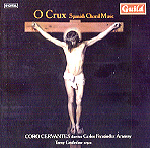There are several surprises on this recording, beginning with the repertoire–19th century Spanish sacred music, much of which is recorded here for the first time and nearly all of which will be virtually unknown to choral music listeners. Due to the oppressive political situation in Spain during the 1800s–especially devastating to the musical functions of the church–composers and choirs had very little opportunity to further the development of any viable, legitimately Spanish religious music. Consequently, the sacred music that was produced came from beyond the borders of Spain and tended to owe its influence to more prevalent European styles, particularly French and German, and to the recognizable attributes of music by composers such as Fauré, Liszt, and Bruckner. In fact, anyone who’s comfortable in the dense-textured, profoundly dramatic, harmonically expansive sound-world of any of the above-mentioned composers will find much to enjoy on this generously filled (nearly 80-minute) CD. (In one of this program’s less-impressive selections there’s even a nod to Mendelssohn at his most cloying and sticky–Amadeo Vives’ setting of O Salutaris; and Felipe Pedrell’s A solis ortus sounds like an English cathedral anthem by Stanford, or any of a number of other very competent Anglican church composers from the latter 19th century.)
Another surprise is Coro Cervantes–a professional London-based ensemble “dedicated solely to the Hispanic classical repertoire”–an exclusive niche if ever there was one! Not surprisingly from an English choir, the standard of ensemble singing is exceptionally high, and on both a technical and interpretive level there’s nothing to fault here. (Interestingly–and unusually–I didn’t recognize any of these 16 singers as belonging to any of the more prominent professional London groups, which speaks well to this choir’s exclusivity and commitment to its narrow-focused vision.) Most listeners will find this program an enjoyable if not thoroughly enlightening experience and will appreciate such ambitious and passionately wrought works as Vicente Goicoechea’s (1854-1916) Ave Maria or Tomás Bretón’s (1850-1923) Salve montserratina. There’s much fascinating music here–none of it especially original or even inspiring, but all of it worth hearing for its priceless contextual/historical importance alone. If only the sound, from Exeter College, Oxford, hadn’t been recorded so closely and obtrusively–then we could enjoy this excellent choir’s performances in a truly balanced, realistic concert-hall perspective. [7/18/2002]
































